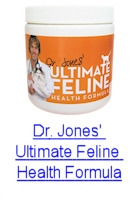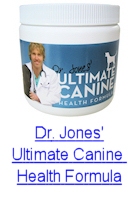Supplement which Stops Anti-inflammatory Side Effects [People and Pets]
March 28th, 2014 at 8:10 am ESTHi Friend,
This is a slightly older study which is now gaining interest as more animals are on anti-inflammatory drugs (NSAIDS), and having side effects.
Specifically vomiting/diarrhea.
Colostrum appears to have a big protective effect.
Ultimate Canine and Ultimate Feline both include colostrum- you can see the exact ingr edients, and hundreds of testimonials here:
edients, and hundreds of testimonials here:
http://www.thedogsupplement.com
http://www.thecatsupplement.com
------------------------------------------------------------------------------
Colostrum and milk-derived peptide growth factors for the treatment of gastrointestinal disorders
------------------------------------------------------------------------------
American Journal of Clinical Nutrition, Vol. 72, No. 1, 5-14, July 2000
2000 American Society for Clinical Nutrition
Raymond J Playford, Christopher E Macdonald and Wendy S Johnson
Colostrum is the specific first diet of mammalian neonates and is rich in immunoglobulins, antimicrobial peptides, and growth factors. In this article we review some of these constituents of human and bovine colostrum in comparison with those of mature milk. Recent studies suggest that colostral fractions, or individual peptides present in colostrum, might be useful for the treatment of a wide variety of gastrointestinal conditions, including inflammatory bowel disease, nonsteroidal anti-inflammatory drug–induced gut injury, and chemotherapy-induced mucositis.
-------------------------------------------------------------
Nonsteroidal antiinflammatory drug–induced gut injury
-------------------------------------------------------------
Nonsteroidal antiinflammatory drugs (NSAIDs) are widely prescribed and are effective in the treatment of musculoskeletal injury and chronic arthritic conditions. Nevertheless, 2% of subjects taking NSAIDs for 1 y suffer from gastrointestinal adverse effects, including bleeding, perforation, and stricture formation of the stomach and intestine .
Acid suppressants and prostaglandin analogues have been shown to be effective in reducing gastric injury induced by NSAIDs but are less effective in preventing small intestinal injury. Novel therapeutic approaches to deal with these problems, such as the use of recombinant peptides, are therefore still required.
A recent series of in vivo and in vitro studies support this idea; EGF and TGF- and TGF-ß have all been shown to reduce NSAID-induced gastric injury.
The beneficial effects of recombinant growth factors on NSAID-induced small and large intestinal injury is, however, less well documented. It was shown recently that a defatted colostrum preparation, which is rich in the growth factors discussed earlier, reduced NSAID-induced gastric and intestinal injury in rats and mice . This material was also shown to effectively reduce gastric erosions in human volunteers taking NSAIDs (J Hunter, personal communication, 1998).
Further support for this approach comes from our recent finding that this defatted colostrum preparation reduced small intestinal permeability, which was used as a marker of intestinal damage in human volunteers taking clinically relevant doses of the drug indomethacin.
Clinical trials involving patients taking NSAIDs long term are under way.
--------------------------------------
Inflammatory bowel disease
--------------------------------------
Studies examining the effect of administration of EGF, PDGF, TGF-ß or IGF-I in animal models of colitis have had encouraging results, and a cheese whey growth factor extract containing several of these growth factors had positive results in a similar model.
Heal Your Pet At Home!
Best Wishes,
Dr Andrew Jones, DVM
P.S. First its good news that this is becoming more mainstream. Obviously much of the colostrum that is ingested is broken down in the stomach/intestinal tract, BUT it still clearly can have certain benefits.
Such as in recurrent vomiting/diarrhea of IBD ( Inflammatory Bowel Disease)
And Especially in disease related to the gut (or from disease we have caused secondary to drugs)
I am occasionally giving my older dog Jessie NSAIDS ( usually Meloxicam).
He has a very sensitive stomach, and will vomit on just about anything, but as I keep supplementing him with the NSAIDS he has never had any side effects.
Clearly it would be better to not use the drugs, but sometimes there are  no other options that work.
no other options that work.
Regardless it's something you should consider.
My supplements contain colostrum, and IF you have yet to try them you can do so for 50% OFF
http://www.thedogsupplement.com
http://www.thecatsupplement.com
